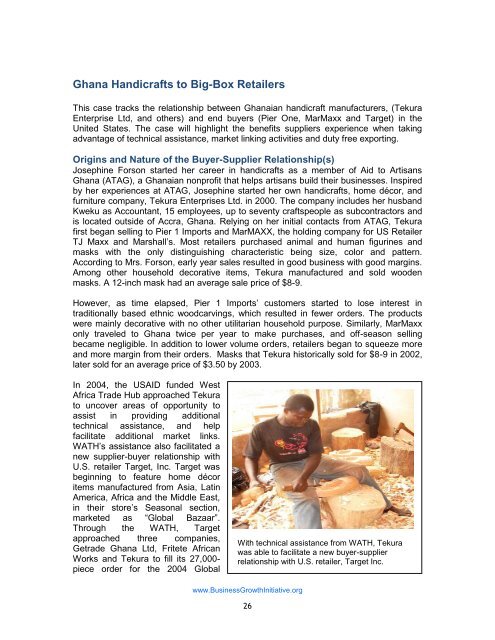the ties that bind - Economic Growth - usaid
the ties that bind - Economic Growth - usaid
the ties that bind - Economic Growth - usaid
Create successful ePaper yourself
Turn your PDF publications into a flip-book with our unique Google optimized e-Paper software.
Ghana Handicrafts to Big-Box Retailers<br />
This case tracks <strong>the</strong> relationship between Ghanaian handicraft manufacturers, (Tekura<br />
Enterprise Ltd, and o<strong>the</strong>rs) and end buyers (Pier One, MarMaxx and Target) in <strong>the</strong><br />
United States. The case will highlight <strong>the</strong> benefits suppliers experience when taking<br />
advantage of technical assistance, market linking activi<strong>ties</strong> and duty free exporting.<br />
Origins and Nature of <strong>the</strong> Buyer-Supplier Relationship(s)<br />
Josephine Forson started her career in handicrafts as a member of Aid to Artisans<br />
Ghana (ATAG), a Ghanaian nonprofit <strong>that</strong> helps artisans build <strong>the</strong>ir businesses. Inspired<br />
by her experiences at ATAG, Josephine started her own handicrafts, home décor, and<br />
furniture company, Tekura Enterprises Ltd. in 2000. The company includes her husband<br />
Kweku as Accountant, 15 employees, up to seventy craftspeople as subcontractors and<br />
is located outside of Accra, Ghana. Relying on her initial contacts from ATAG, Tekura<br />
first began selling to Pier 1 Imports and MarMAXX, <strong>the</strong> holding company for US Retailer<br />
TJ Maxx and Marshall‟s. Most retailers purchased animal and human figurines and<br />
masks with <strong>the</strong> only distinguishing characteristic being size, color and pattern.<br />
According to Mrs. Forson, early year sales resulted in good business with good margins.<br />
Among o<strong>the</strong>r household decorative items, Tekura manufactured and sold wooden<br />
masks. A 12-inch mask had an average sale price of $8-9.<br />
However, as time elapsed, Pier 1 Imports‟ customers started to lose interest in<br />
traditionally based ethnic woodcarvings, which resulted in fewer orders. The products<br />
were mainly decorative with no o<strong>the</strong>r utilitarian household purpose. Similarly, MarMaxx<br />
only traveled to Ghana twice per year to make purchases, and off-season selling<br />
became negligible. In addition to lower volume orders, retailers began to squeeze more<br />
and more margin from <strong>the</strong>ir orders. Masks <strong>that</strong> Tekura historically sold for $8-9 in 2002,<br />
later sold for an average price of $3.50 by 2003.<br />
In 2004, <strong>the</strong> USAID funded West<br />
Africa Trade Hub approached Tekura<br />
to uncover areas of opportunity to<br />
assist in providing additional<br />
technical assistance, and help<br />
facilitate additional market links.<br />
WATH‟s assistance also facilitated a<br />
new supplier-buyer relationship with<br />
U.S. retailer Target, Inc. Target was<br />
beginning to feature home décor<br />
items manufactured from Asia, Latin<br />
America, Africa and <strong>the</strong> Middle East,<br />
in <strong>the</strong>ir store‟s Seasonal section,<br />
marketed as “Global Bazaar”.<br />
Through <strong>the</strong> WATH, Target<br />
approached three companies,<br />
Getrade Ghana Ltd, Fritete African<br />
Works and Tekura to fill its 27,000piece<br />
order for <strong>the</strong> 2004 Global<br />
With technical assistance from WATH, Tekura<br />
was able to facilitate a new buyer-supplier<br />
relationship with U.S. retailer, Target Inc.<br />
www.Business<strong>Growth</strong>Initiative.org<br />
26

















